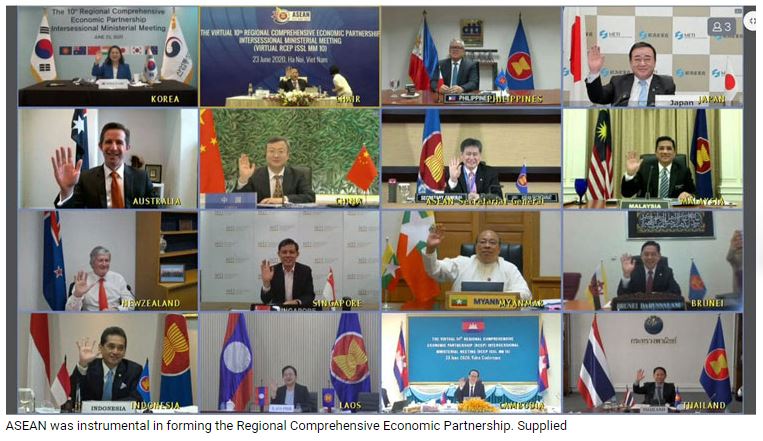Cambodia will be at helm of ASEAN economic unity global trade rivalries play out
The tricky task of maintaining regional economic unity may come to the fore when Cambodia takes over the ASEAN chair from Brunei next year. The nation will get a taste of the reins before then, when it hosts the 13th Asia-Europe Summit (ASEM13) in November before formally taking over leadership of the regional body from this year’s chair, Brunei. ASEAN’s regional importance was emphasised this week by UK Foreign Secretary Dominic Raab’s visit to Vietnam, Cambodia and Singapore. Yesterday he met Cambodia’s Minister for Foreign Affairs, Prak Sokhonn. Raab said he was in Cambodia “to boost trade, support Cambodia’s energy transition, expand UK ASEAN cooperation and as a force for good in the Indo-Pacific.” He is the first British foreign secretary to visit the Kingdom since 1953.
ASEAN has already established its global relevance, according to Japan’s Nikkei media organisation, through meetings such as this month’s ASEAN Defence Ministers’ Meeting Plus. That gathering was attended by the US Defense Secretary Lloyd Austin and his Chinese counterpart General Wei Fenghe. The two sparred verbally during the encounter over regional stability and territorial issues.
“The grouping of 10 small and medium-size economies has become the glue for a host of regional diplomatic forums and economic initiatives but, as the world’s biggest powers push their own Indo-Pacific strategies, ASEAN’s centrality and togetherness will become all the more difficult to maintain,” Nikkei warned. ASEAN members were instrumental in forging the world’s largest free trade agreement, the Regional Comprehensive Economic Partnership (RCEP), which was concluded last year with China, Japan, South Korea, Australia and New Zealand all signing on, among others. The agreement covers almost one third of the global economy and population.
“Budget deficits are increasing in many Asian countries and infrastructure investment is very important” said former Asian Development Bank Institute Dean Naoyuki Yoshino. “China may be interested in financing and constructing infrastructure projects but it is important to bring in private sector finance from ASEAN countries. So internal assistance by using private finance will be key to Asian development. Private sector finance will be much more important than seeking help from other countries.
“I think it’s better for ASEAN countries to be independent from any China-US trade war because some countries’ connection with China are bigger than others. As far as US-China relations with ASEAN, it will be different from one country to another. The main point is to be neutral in their behaviour and grow their economies without relying on one or other of the countries. ASEAN as a whole will have a strong circulation of savings within the region that can contribute to growth,” said Professor Yoshino, of Japan’s Keio University.
Ahead of the formation of RCEP, US Ambassador to Cambodia W. Patrick Murphy pointed out that ASEAN has a huge amount of economic clout. It is the US’ fourth largest trading partner. The United States was the region’s largest source of investment in 2019.
Source: https://www.khmertimeskh.com/50880148/cambodia-will-be-at-helm-of-asean-economic-unity-global-trade-rivalries-play-out/


 English
English




